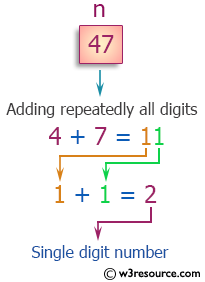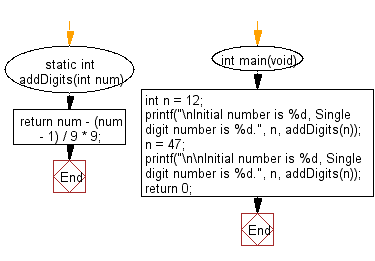C Exercises: Add repeatedly all digits of a given non-negative number until the result has only one digit
12. Add Digits to One Digit Variants
Write a C program to add repeatedly all digits of a given non-negative number until the result has only one digit.
Example:
Input: 48
Output: 2
Explanation: The formula is like: 4 + 8 = 12, 1 + 2 = 3.
Visual Presentation:

Sample Solution:
C Code:
#include <stdio.h>
// Function to calculate the digital root of a number (single-digit sum)
static int addDigits(int num) {
// Formula to calculate the digital root of a number using a mathematical property
// The digital root of a positive integer num is equivalent to num - (num - 1) / 9 * 9
return num - (num - 1) / 9 * 9;
}
// Main function to test the addDigits function with different numbers
int main(void) {
int n = 12;
printf("\nInitial number is %d, Single digit number is %d.", n, addDigits(n));
n = 47;
printf("\n\nInitial number is %d, Single digit number is %d.", n, addDigits(n));
return 0;
}
Sample Output:
Initial number is 12, Single digit number is 3. Initial number is 47, Single digit number is 2.
Flowchart:

For more Practice: Solve these Related Problems:
- Write a C program to repeatedly add digits of a number until a single-digit result is obtained using recursion.
- Write a C program to compute the digital root of a number in a single expression without loops.
- Write a C program to perform digit addition iteratively and print each intermediate sum.
- Write a C program to optimize the digit sum process using mathematical properties to compute the digital root.
Go to:
PREV : Count Digit 1 Occurrences Variants.
NEXT : Power of Three Check Variants.
C Programming Code Editor:
Improve this sample solution and post your code through Disqus.
What is the difficulty level of this exercise?
Test your Programming skills with w3resource's quiz.
